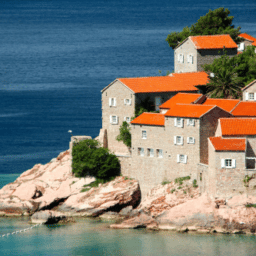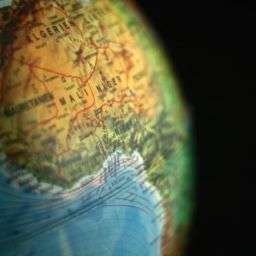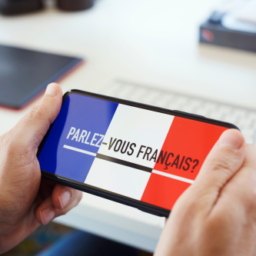
Cyprus is a country in the Mediterranean, situated on an island of the same name. It lies on the borderland of Europe and Asia. For cultural, historical and political reasons it belongs to our continent; its geography and proximity to the Turkish coast adds to its Asian nature.
There are technically two countries on Cyprus: the independent Republic of Cyprus and, not recognized internationally, the Turkish Republic of Northern Cyprus. The island is divided and so is its population. The languages heard on the streets of the countries’ capital, Nicosia, are a reflection of this difficult situation.
Contents
Cyprus – the island of Aphrodite
The territory of Cyprus occupies 9,300 sq. km. It is a popular holiday destination thanks to its long coastline (which spans over 648 km), a considerable amount of sunshine (3,300-3,400 hours per year), Mediterranean climate, breathtaking views, sandy beaches and delicious cuisine.
According to Greek mythology, on the coast of Cyprus Aphrodite, the Greek goddess of beauty and love, was born. And meanwhile you can believe it or doubt it, what you cannot do is to omit the beach named after her. Aphrodite’s Beach is situated in proximity to the town of Paphos and will surprise you with clear water and photogenic scenery. There are many places on the island that are worth visiting, picking just a few is not an easy task. However, we strongly recommend including Cape Greco, salt lake in Larnaca, The Archaeological Park of Kato Paphos and Avakas Gorge on your list.
Historical background
The history of Cyprus was incredibly turbulent. From Antiquity until the 12th century, Greek influence dominated over the island. The situation began to shift when, in 1191, the crusaders appeared on its territory. The 16th century brought the next change: Turkish invasion. At that time, as a way to adapt to the new circumstances, many residents decided to convert into Islam.
The years under Turkish rule weren’t fruitful for Cyprus. In 1821, as a way of protest, Greek Cypriots started an uprising. The enosis, a movement in favour of joining Greece, began. It encountered Turkish retaliation and didn’t happen until now.
In 1876–1878 British occupation of Cyprus began. It was justified as a way to prevent Russia from gaining crucial positions in the Mediterranean. Turkish Cypriots were guaranteed religious liberty. The rule of the United Kingdom lasted longer than it was agreed upon. The First World War fortified its position on the island. Nevertheless, the endeavour of joining Greece persisted among Greek Cypriots.
The second half of the 20th century brought more bloody conflicts to Cyprus. In 1955 Turkish and Greek Cypriots began negotiations, in which the United Kingdom acted as moderator. Instead of bringing peace, they led to the introduction of martial law and brutal activities of the Greek National Organisation of Cypriot Fighters (EOKA) and the Turkish Resistance Organisation (VOLKAN).
In 1960 Cyprus finally became an independent country. As a measure of preventing future conflicts, the government was split between both nations. The president was chosen from between Greeks, meanwhile the vice president, from between Turkish. The system proved unsuccessful and the old dispute continued. A turning point occurred in 1974; however, it wasn’t the one expected by the UN and peaceful-minded residents. That year brought a military coup against the president and clergymen Makarios III and the Turkish invasion on the island. As a consequence, a new country, the Turkish Republic of Northern Cyprus, was founded in 1983. Until today, only Turkey has recognized it as a state.
Despite many attempts to solve the conflict, it continues without ceasing. The hardest efforts took place just before Cyprus joined the European Union. As it didn’t prove successful, in 2004 only the southern part of the island became a member of the community. Until now, Nicosia, the capital of both Greek Cypriots and Turkish Cypriots, has been divided by a wall. To cross to another side, it is necessary to pass border control.
Demographics of Cyprus
Let’s take a look at the demographic background of the island. Currently, it is home to more than 860,000 people; 76.1% of the population is of Greek origin; 10.2%, Turkish; 13.7%, foreign (source: mfa.gov.cy). In the last few years, the government of the Republic of Cyprus has observed a gradual settlement of the Turkish population from the continent in the northern part of the island. The goal of this phenomenon is supposed to be gaining demographic supremacy over Greek Cypriots.
Official languages of Cyprus
The constitution of the Republic of Cyprus (valid from 1983) recognizes two official languages: Greek and Turkish. The standard versions of those languages are used in formal situations, meanwhile, on a daily basis, Greek Cypriots speak in the Cypriot dialect of Greek; and Turkish Cypriots, in the Cypriot dialect of Turkish. The two languages influence each other, what can be observed in borrowed vocabulary, among others.
Cypriot Greek
Greek has been present in Cyprus for a long time; since 12th or 11th century B.C. The first written evidence – inscriptions – are dated to the 10th century B.C. The dialect originated from Medieval Greek. The languages of different colonisers of the island contributed to its development. Currently, its status can be described as lingua franca, as it is also known to Turkish Cypriots. There are around 700,000 Greek speakers in Cyprus.
It is possible to note many differences between the Cypriot dialect and Greek spoken in Athens, especially in phonology and morphology. Some native users of standard Greek may have problems understanding the variation.
In turn, the standard version of Greek is known to the Cypriots. Since the 19th century, it has been taught in schools and used by Greek-speaking media. The local population can switch fluently between the dialects, depending on the communication situation. This phenomenon bears the name of diglossia.
Greek alphabet
In Cypriot public space, it is possible to see both Greek and Latin alphabets. You don’t need to learn the symbols to survive on the island. However, we strongly recommend getting the basics. It really isn’t as difficult as it seems!
Let’s take a look at the letters: Α α (alfa), Β β (beta), Γ γ (gamma), Δ δ (delta), Ε ε (epsilon) Ζ ζ (dzeta), Η η (eta), Θ θ (theta), Ι ι (jota), Κ κ (kappa), Λ λ (lambda), Μ μ (mi), Ν ν (ni), Ξ ξ (ksi), Ο ο (omikron), Π π (pi), Ρ ρ (rho), Σ σ (sigma), Τ τ (tau), Υ υ (ypsilon), Φ φ (fi), Χ χ (chi), Ψψ (psi), Ω ω (omega).
Cypriot Turkish
The residents of the island with Turkish roots speak Cypriot Turkish on a daily basis. This language appeared in Cyprus four centuries ago. The variation can be considered as a mix between Ottoman Turkish and Yörük dialect. There is no standardised writing system, so the orthography of standard Turkish has been used.
Since the Turkish invasion of Cyprus, Cypriot Turkish has been used almost exclusively in the Turkish Republic of Northern Cyprus. It has around 300,000 speakers. In the schools, media and administration, standard Turkish is preferred.
Turkish alphabet
The Latin alphabet has been used for writing in Turkish since 1928. That means that reading it shouldn’t result in a problem for us. However, it is advisable to pay attention to a few characters that differ: “ç”, “ğ”, “ı”, “ş” and “ü”.



Minority languages in Cyprus
There are few minority languages in Cyprus. The European Charter for Minority or Regional Languages covers two of them: Armenian and Cypriot Arabic (Sanna).
Armenian in Cyprus
The Armenians have been part of the Cypriot population since the 9th century. A few thousand of them arrived at the begging of the 20th century, while fleeing from the genocide. Nowadays, their language is taught in schools to which this minority attends. There are around 3,000 people with Armenian roots in Cyprus. Most of them consider themselves bilingual and don’t have difficulties with switching to Greek.
Cypriot Arabic (Sanna)
Cypriot Arabic is considered a language in danger of disappearing. There are only a few hundred people who are fluent in this dialect. All of them are bilingual and able to speak Greek.
Foreign languages in Cyprus
According to 2011 census data, around 35,000 Cypriots are native speakers of English; 24,000 – Romanian; 21,000 – Russian and 18,000 – Bulgarian.
Cypriots demonstrate a high level of English; 76% of residents declare fluency in this language (source: howwidelyspoke.com). Menus in restaurants and traffic signs have their English versions. During British rule, it was the only official language.
English is not the only foreign language taught in Cypriot schools; French and German classes are also popular. A special place belongs to Russian due to a significant number of tourists and residents that arrived from the Soviet Union. It is possible to find Russian-speaking staff in all major hotels, restaurants, and shopping centres.
Basic phrases
You will have no problem surviving with just English (or Russian) in Cyprus. However, knowing a few basic phrases in Greek or Turkish will help you make friends. Try to greet and thank your hosts in their language!
Basic phrases in Greek
Let’s take a look at some basic phrases in Greek. The ones you will find below are already romanized, so you can understand them even if you haven’t grasped the Greek alphabet yet.
- Good morning – Kalíh méra
- Good evening – Kalíh spéra
- Good night – Kalíh níkta
- Hello – Hérete
- Goodbye – Adhío
- Have a nice journey – Kalóp
- Yes – Néch
- No – Ohi
- I don’t understand – Den Katalavéno
- What is your name? – Pos se léne?
- My name is… – Mech léne…
- Thank you – Efharistóp
- Please – Parakalóp
- Excuse me – Signómi
Basic phrases in Turkish
- Good morning – Günaydın
- Good afternoon – İyi günler
- Good evening – İyi akşamlar
- Hello – Merhaba/ Selam
- Goodbye – Görüşürüz/ Görüşmek üzere
- Good night – İyi geceler
- Have a good journey – İyi yolculuklar
- Yes – Evet
- No – Hayır
- I don’t understand – Anlamıyorum
- What is your name? – Adın ne?/ Adiniz ne?
- My name is… – Benim adım…/ Adım…
- Thank you – Teşekkür ederim
- Please – Lütfen
- Here you are – Buyrun
- Excuse me – Affedersiniz
- Sorry – Özür dilerim
Our translators and interpreters are one of the most professional in the market. They will cope with any task related to translation from and into Greek or Turkish. You won’t have to worry about your documents, they will be in capable hands. Just write to us!
Multicultural Cyprus
The history of Cyprus hasn’t been easy, and the conflict between the two nations still lasts. Despite this, it is an incredible country, worth visiting. Its architecture and cuisine are strongly influenced by multiculturalism. The residents of the island are warm and friendly with tourists and will make your journey truly memorable.















